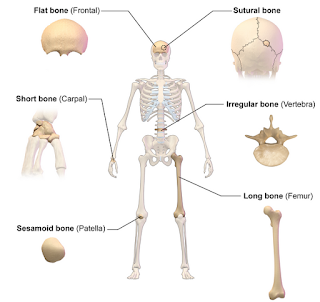There are five bone types involved in the human movement system: long, short, flat, irregular, sesamoid and. The following concern us most: long, short and sesamoid.
Long:
- Long, cylindrical shaft with irregular or widened ends.
- Consist primarily of composit bone for strength and stiffness.
- Such bones include the femur, humerus and metacarpals. The epiphysis, or end of the long bones, is the primary site for bone growth.
- Until its epiphyseal plate fuses in adulthood, it is vulnerable to injury. This is why weight-bearing exercise can be dangerous for children, however on the flip side it does allow children to develop stronger healthier bones.
Short:
- Appear somewhat cubical in shape being similar in length and width.
- Consist primarily of spongy bone to maximise shock absorption such as in jogging, jumping or punching.
- These include the small bones of the wrists (carpals) and upper foot (tarsals).
Sesamoid:
- Small, and often round, they are found embedded in joint capsules or where a tendon passes over a joint where there is considerable friction or tension.
- They help improve leverage as well as protecting the joint from damage. The most notable being the patella, or "knee-cap".
Articles within this series
Lyle Richardson,
Gym Pal - Your friend in the world of fitness



0 comments:
Post a Comment